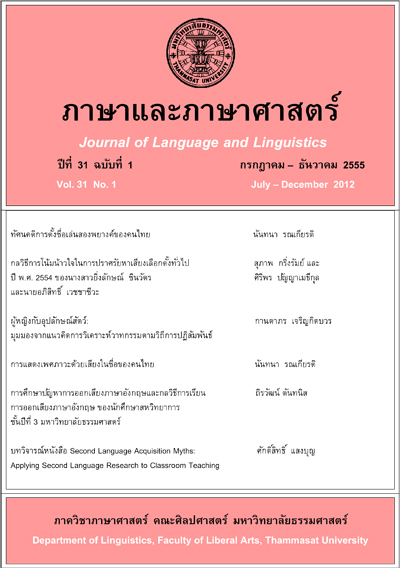กลวิธีการโน้มน้าวใจในการปราศรัยหาเสียงเลือกตั้งทั่วไป ปี พ.ศ. 2554 ของ นางสาวยิ่งลักษณ์ ชินวัตรและนายอภิสิทธิ์ เวชชาชีวะ
Main Article Content
Abstract
บทคัดย่อ
งานวิจัยนี้ศึกษากลวิธีการโน้มน้าวใจในการปราศรัยหาเสียงของนางสาวยิ่งลักษณ์ ชินวัตรและนายอภิสิทธิ์ เวชชาชีวะ โดยพบว่าการเลือกใช้กลวิธีการโน้มน้าวใจผู้ฟังของทั้งสองคล้ายกัน แต่มีปริมาณการเลือกใช้ที่แตกต่างกัน นางสาวยิ่งลักษณ์ ชินวัตรเลือกใช้กลวิธีการนำเสนอความเท่าเทียมทางเพศ เพื่อพยายามทำให้เห็นถึงความเท่าเทียมกันในการทำงานของสตรีและเพื่อนำเสนอตนเองในฐานะที่เป็นผู้หญิงคนแรกที่เข้าชิงตำแหน่งนายกรัฐมนตรีหญิงคนแรกของประเทศไทย ใช้วัจนกรรมขอร้องและวัจนกรรมสัญญา เพื่อยืนยันและให้การสนับสนุนการทำงานของตนเองที่จะทำให้กับประชาชนในอนาคตหากได้รับคะแนนเสียงการเลือกตั้ง และใช้กลวิธีการแสดงหลักฐานอ้างอิง พ.ต.ท. ทักษิณ ชินวัตร เพื่อถ่ายโอนการยอมรับจากประชาชน ซึ่งแตกต่างจากนายอภิสิทธิ์ เวชชาชีวะที่ใช้กลวิธีการแสดงหลักฐานด้วยการอ้างอิงบุคคลอื่นเพื่อเป็นการสนับสนุนการทำงานของตนเอง และนโยบายของพรรคที่ได้ดำเนินการในสมัยที่ดำรงตำแหน่งเป็นนายกรัฐมนตรี ใช้กลวิธีการใช้คำถามย้อนกลับ ซึ่งเป็นกลวิธีที่มักพบในผู้ที่มีประสบการณ์ทางการเมืองมาก ดังนั้น กลวิธีนี้จึงพบไม่มากนักในการปราศรัยของนางสาวยิ่งลักษณ์ ชินวัตร นายอภิสิทธิ์ เวชชาชีวะเลือกใช้วัจนกรรมยืนยันการทำงานมากกว่าจะใช้วัจนกรรมขอร้องซึ่งแตกต่างจากนางสาวยิ่งลักษณ์ ชินวัตร
Abstract
The study revealed that there were similarities of using persuasive strategies among Miss Yingluck Shinawatra and Mister Abhisit Vejjajiva but there were differences in the quantity of using persuasive strategies which were Miss Yingluck Shinawatra used the presenting gender equality strategy to show the equality of women’s work and to present herself as the first female candidate for Prime Minister of Thailand. She used her feminine gender through speech acts of promising and requesting strategies to assure and support things that she would do if elected, and also gave proof of reference to Thaksin Shinawatra in order to win acceptance from the people. While, Mister Vejjajiva gave proof of past successes and well-known people to support his party’s policies when being Prime Minister by using rhetorical questions, which was less found in Miss Shinawatra's speech, and speech acts of assertion about his past successes. The study revealed that persuasive strategies of Miss Yingluck Shinawatra and Mister Abhisit Vejjajiva were influenced by gender, political experience, social status, places where they made speeches, and the length of those speeches.Article Details
บทความทุกบทความเป็นลิขสิทธิ์ของภาษาและภาษาศาสตร์


